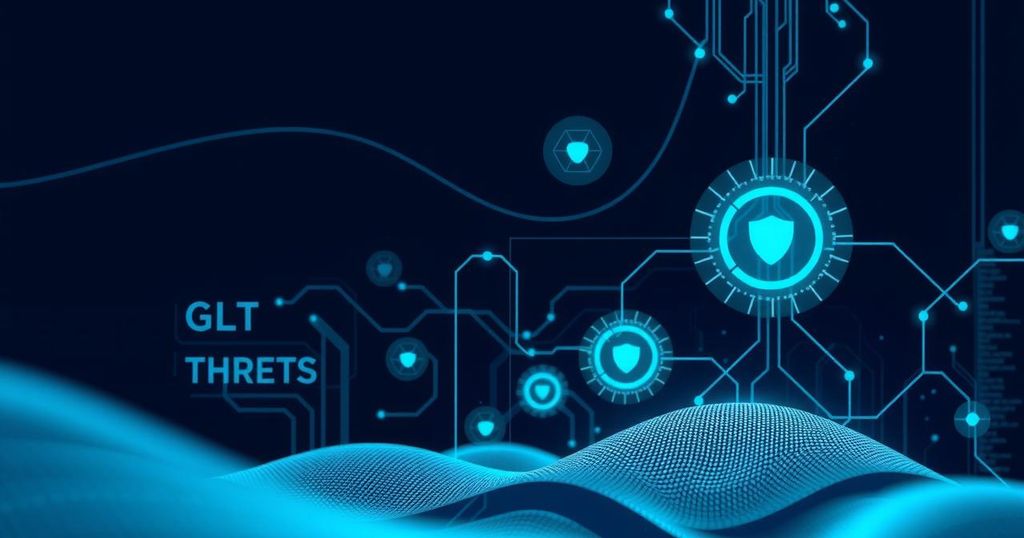South Africa’s aspirations for a thriving digital economy are jeopardized by increasing cyber threats, particularly ransomware and digital extortion, as highlighted in recent reports. Despite existing frameworks, enforcement is weak and infrastructure vulnerabilities remain. Collaborative efforts between government, businesses, and individuals are essential to strengthen cybersecurity and realize the potential of South Africa as a leading digital economy in Africa.
South Africa, recognized as one of Africa’s leading economies, faces considerable challenges as it strives for a digital future while combating escalating cyber threats. With the Global community’s attention on South Africa in 2025 due to its G20 presidency, the nation is expected to enhance its digital economy. However, analysts warn that achieving these objectives amidst growing cybercrime may be more daunting than anticipated.
According to Trisha Govender, Manager at MANCOSA School of Information and Digital Technology, although South Africa plays a vital role in digital connectivity, it ranks among the world’s most targeted nations for cybercrime. While the legal framework addressing cyber risks has been established, questions linger about its agility to adapt to evolving cyber threat trends.
The 2024 Interpol African Cyberthreat Assessment Report highlights the alarming rise of ransomware and digital extortion throughout the continent as significant threats. These cyber attacks not only inflict severe financial damage but can also disrupt critical infrastructure and essential services, ultimately harming both organizations and individuals.
Research by Check Point indicates that during Q1 2023, approximately one in 15 organizations in Africa fell victim to ransomware attempts each week, surpassing the global average of one in 31. In February 2023 alone, over 300 ransomware attempts were detected in South Africa, reflecting an alarming rise in the frequency and financial impact of such attacks, with the average cost of a ransomware attack climbing to $5.13 million.
Govender anticipates the upcoming 2025 edition of the cyber threat report to shed light on the 2024 landscape, while emphasizing Africa’s vulnerability, as cybercriminals continue to exploit weaknesses within the region. The report identifies ransomware and business email compromise as rapid-growing threats, which warrant urgent attention to mitigate their impact.
Despite an increased awareness of cyber threats in South Africa, progress towards addressing these issues pragmatically remains limited. Factors such as inadequate enforcement of existing laws like the Cybercrimes Act and POPIA, skill shortages, and outdated infrastructure contribute to the nation’s susceptibility to cyber risks.
Govender advocates for increased funding for cyber enforcement and the establishment of specialized cyber prosecution units, similar to those in Europe, as potential solutions to these challenges. Furthermore, mandatory cybersecurity regulations for critical infrastructure are needed to secure sectors such as healthcare and energy, which are particularly vulnerable to cyber attacks.
The responsibility to tackle cyber risks lies collectively with the government, businesses, and individuals. Government entities must enforce cyber laws, develop a national cybersecurity strategy, and enhance protection for critical infrastructures. Companies are urged to put robust cybersecurity policies into action, invest in employee training, and collaborate with governmental bodies to share threat intelligence. Individuals too should practice sound cyber hygiene to protect themselves and report cybercrime effectively.
Despite the rising cyber threats, Govender maintains that South Africa has the potential to become a leading digital economy in Africa. The nation possesses a robust tech ecosystem, burgeoning AI and fintech sectors, and proactive government digital initiatives. However, significant improvements in cybersecurity infrastructure are needed to support competitive growth in the tech arena. Investing in cybersecurity education, fostering collaboration between government and business, and mandating compliance for critical sectors will be essential steps toward securing South Africa’s digital future.
In conclusion, South Africa’s pursuit of a digital economy is critically hampered by persistent cyber threats. While there are frameworks in place to address cybercrime, enforcement gaps and vulnerabilities in critical infrastructure remain major concerns. The collaborative effort of government, businesses, and individuals is imperative to fortify the nation’s cybersecurity landscape. Through investment in education and compliance, South Africa can potentially transition into a formidable digital economy, provided it effectively navigates the current cyber challenges.
Original Source: www.zawya.com






